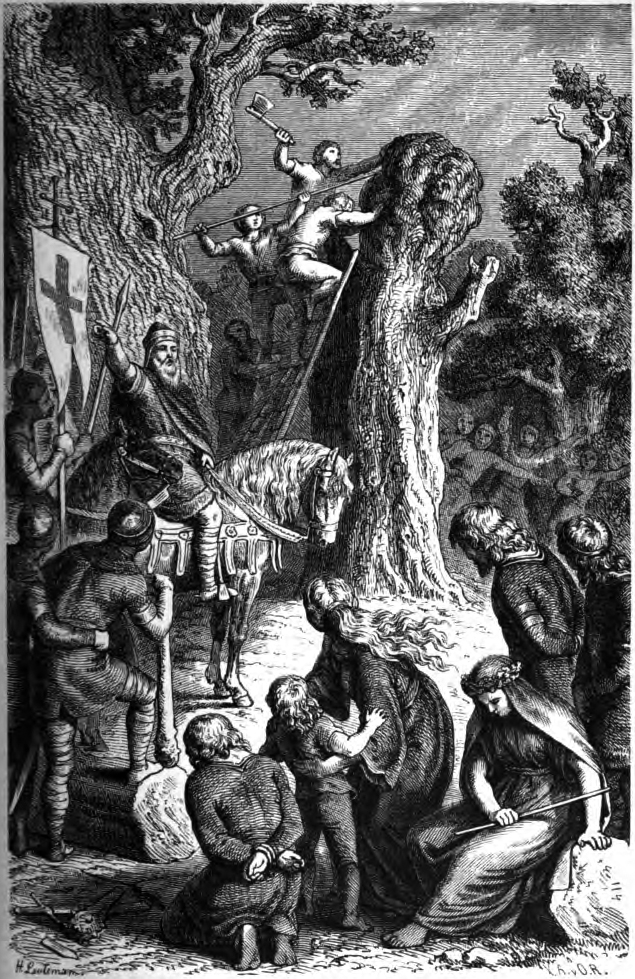 |
Goddess Iduna
One curious item, which I had skipped earlier while writing this series, was the mention of the Norse Goddess Iðunn.
Excerpt from page 6 of 'The Secret of the Runes' (from Flowers' bio section):
List became involved with two important literary associations during these years. In May 1891, the Iduna, bearing the descriptive subtitle "Free German Society for Literature," was founded by a circle of writers around Fritz Lemmermayer. Lemmermayer acted as a sort of "middle man" between an older generation of authors (which included Fercher von Steinwand, Joseph Tandler, Auguste Hyrtl, Ludwig von Mertens, and Josephine von Knorr) and a group of younger writers and thinkers (which included Rudolf Steiner, Marie Eugenie delle Grazie, and Karl Maria Heidt). The name Iduna, which was provided by List himself, is that of a North Germanic goddess of eternal youth and renewal.
Idun, Iduna, or Idunna, are variations of Iðunn. Actually, this literary society was short lived; only lasting about two years due to philosophical differences. Despite that, it was thought to have been part of the beginnings of the Neo-Germanic movement. In 'The Secret of the Runes', the Wotanist spiritual concept of "Life, Death, and Rebirth" is frequently mentioned. It's not surprising that List selected Iduna for a name, since she symbolized that concept.
Lower Austria
List was born and raised in Vienna, so I found myself occasionally lost when the geographical term "Lower Austria" was brought up time and time again in regards to him. Actually, Lower Austria is located in the northeast corner of Austria, east of "Upper Austria." Actually, the northernmost part of Lower Austria is farther north than the northernmost part of Upper Austria. However, this is where he was from, and it seems pretty clear to me that he was very close to it in every way.
Wotanism to Christianity
List held a romantic vision of what Germanic-Wotanist life was like during pre-Roman/Christian times. He described in detail how society was organized. It's detailed enough that one would need to buy the book to really appreciate it. Suffice to say, he believed-and I think clearly proved--that the "skaldic class," or the Wotanist spiritual leaders, developed a complex system "to veil Wotanist culture within Christianity" when conversion was considered unavoidable. This included a very complex system of double-meanings of words, symbols, architecture, and aspects of everyday life. I can't do it justice here.
 |
| "The destruction of Irminsul by Charlemagne" |
As to whether or not they performed this out of spite, or merely to protect their spirituality and culture, I don't know. I tend to lean towards the latter, although the period of religious conversion was bloody. The Gaelic people made the conversion fairly easily, and they performed basically the same type of religious cultural blending. The Wotanists didn't "blend" as much as they "disguised." West Africans, living under slavery in Latin America, were able to hide their tribal spiritual traditions within Catholic religious rites; and they were able to propagate these traditions generation after generation.
As we covered in earlier segments, there is no conflict between Wotanism and science, as there is in other religions. Excerpt from pages 76 and 77: Because the skalds, as the scientists, maintained language, art, and science, they were also primarily concerned with scientifically directing the transition from Wuotanism to Christianity, and to prepare the way for a peaceful blending of the two religions.
Now, according to List, this was the plan prior to Charlemagne's bloody rein. A Frankish King and Catholic supremacist, he was extremely aggressive in his approach to "Christianization." More than merely inform villagers that they must convert, he would destroy and burn down irminsuls, holy sites, and other religious structures, torture and hang people, etc. Even the earlier Romans had used a soft approach when it came to forced religious conversion of subjugated peoples.
The skalds apparently were not explicitly secretive in their "blending" preparations before Charlemagne. However, now they had to do something quickly. I will cover that in the next segment.
WOW
Just this morning, I was listening to an online audio interview with a man whom I respected who happens to be a born-again-Christian. Now, he is a minister/researcher, and his faith is totally above-board and fully understood to the general public, myself included. I don't feel comfortable revealing his name right now. However, I overheard him smugly make statements; such as "Yule " being a "Satanic holy day" and the like.
Even if you're a Christian, or Athiest, or whatever; it's worth pondering that some of our Camun ancestors, only a few centuries ago, were slain in their own land via "this type of thinking." I'm not saying that every Christian minister believes as he does. Chuck Missler, for example, is very open-minded and knowledgeable about a whole host of subjects. In other words... not everything non-Christian is "the Devil."
WOW
Just this morning, I was listening to an online audio interview with a man whom I respected who happens to be a born-again-Christian. Now, he is a minister/researcher, and his faith is totally above-board and fully understood to the general public, myself included. I don't feel comfortable revealing his name right now. However, I overheard him smugly make statements; such as "Yule " being a "Satanic holy day" and the like.
Even if you're a Christian, or Athiest, or whatever; it's worth pondering that some of our Camun ancestors, only a few centuries ago, were slain in their own land via "this type of thinking." I'm not saying that every Christian minister believes as he does. Chuck Missler, for example, is very open-minded and knowledgeable about a whole host of subjects. In other words... not everything non-Christian is "the Devil."

No comments:
Post a Comment